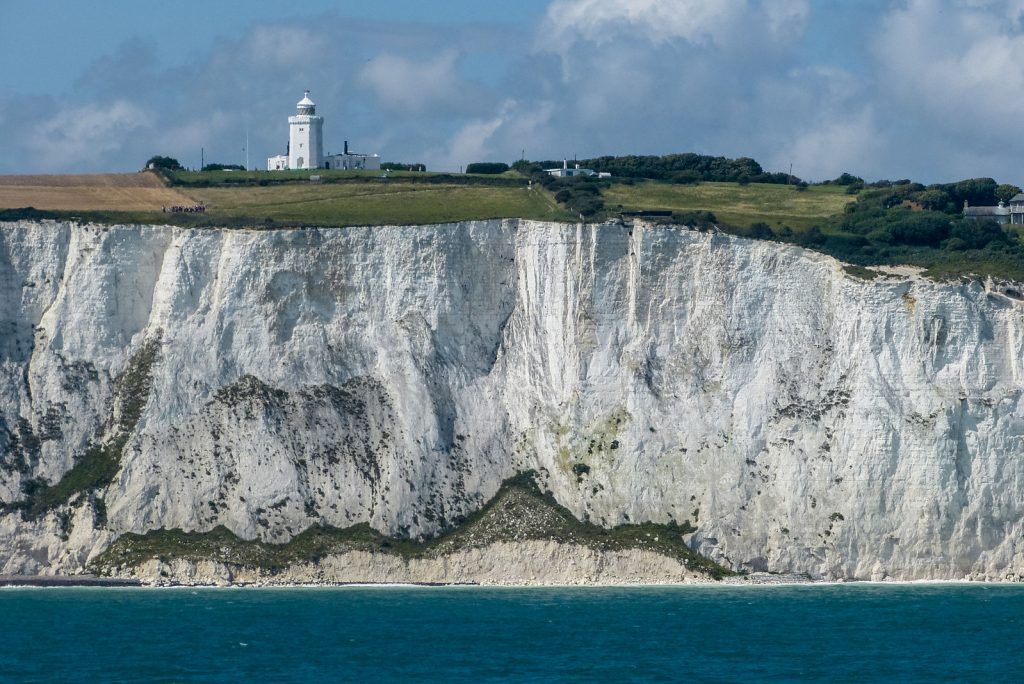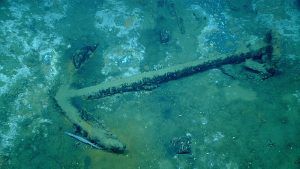End of a carbon dioxide sink?
By Sabrina Imbler | March 19, 2019
 Dover's famed White Cliffs are actually comprised of millions of years' worth of dead plankton, otherwise known as marine snow. And they had served as a carbon sink, storing vast amounts of carbon dioxide. Image courtesy Wikimedia, under Creative Commons license.
Dover's famed White Cliffs are actually comprised of millions of years' worth of dead plankton, otherwise known as marine snow. And they had served as a carbon sink, storing vast amounts of carbon dioxide. Image courtesy Wikimedia, under Creative Commons license.
Editor’s note: This story was originally published by Atlas Obscura. It appears here as part of the Climate Desk collaboration.
The bottom of the ocean holds one of the world’s largest and most populous graveyards. It’s crammed with organisms too tiny to see, including plankton, protists, and a type of marine algae called coccoliths. The continuous shower of bodies has a surprisingly beautiful name: marine snow. Over the years, this macabre blizzard compacts to a water-rich sludge at the seabed. Over millennia, it compacts to solid rock. England’s White Cliffs of Dover are a prime example of prehistoric marine snow, comprising layers of Cretaceous-era plankton that compacted 70 million years ago when Great Britain was still submerged under the sea.
Marine snow is more than an underwater memorial to the microscopic. It also functions as a carbon sink, absorbing carbon dioxide emissions from the atmosphere and locking the carbon away for millennia. In this way, marine snow is one of nature’s greatest safeguards against global warming. Today, these sinks produce more than 25 percent of the oxygen we breathe. Scientists have understood marine snow’s role in the carbon cycle for some time now, but had never quantified the significance of its effect over geological time, until now.
In a new study published in Geology, scientists Adriana Dutkiewicz and R. Dietmar Müller from the University of Sydney have measured marine snow’s immense role in keeping the planet cool for millions of years. Using data from drilled core samples across the global ocean from the past 50 years, the scientists used a computer model to track the growth of the deep-sea carbon sink over the past 120 million years. The study also found that these ocean sinks may not survive the twin evils of global warming and ocean acidification, which have the potential to almost entirely halt marine snow’s ability to bury carbon dioxide.

It’s impossible for a lone coccolith, dead or alive, to make it to the seafloor without succumbing to the naturally corrosive metals of seawater — even before acidification. On their own, the critters’ carbonate skeletons would dissolve long before arriving at the seabed. But after coccoliths are eaten and digested by larger zooplankton (a common demise for a coccolith), they make the downward journey concentrated within the protective walls of a fecal pellet. These tiny, dense packages of poo both preserve coccoliths and ensure they sink rapidly, traveling as far as 200 meters a day in a race to join their brethren in a sludge over hundreds of meters thick.
According to Müller, zooplankton may disappear in a warming ocean, which lacks the nitrogen and phosphorous the animals need to survive. And there’s more to this ripple effect: “Without having an intact food chain, this carbon sink also would not work, as the coccoliths would likely all dissolve on the way down if they don’t get eaten first,” Muller writes in an email. At the end of this ripple effect is a deep ocean drastically less equipped to handle our growing carbon emissions.
To save the sink, Müller says we need to start thinking on a grander scale: “Understanding the rhythms of Earth’s geological past and thinking about time like a geologist can give us the perspective we need for a more sustainable future.”
Or else we may lose the one graveyard in the world that’s keeping us all alive.
Together, we make the world safer.
The Bulletin elevates expert voices above the noise. But as an independent nonprofit organization, our operations depend on the support of readers like you. Help us continue to deliver quality journalism that holds leaders accountable. Your support of our work at any level is important. In return, we promise our coverage will be understandable, influential, vigilant, solution-oriented, and fair-minded. Together we can make a difference.
Keywords: climate change research, ocean acidification, ocean warming
Topics: Analysis, Climate Change















Never heard this before, makes sense. Motivates me even more. Makes me even more glad I continued the subscription I inherited from my father.